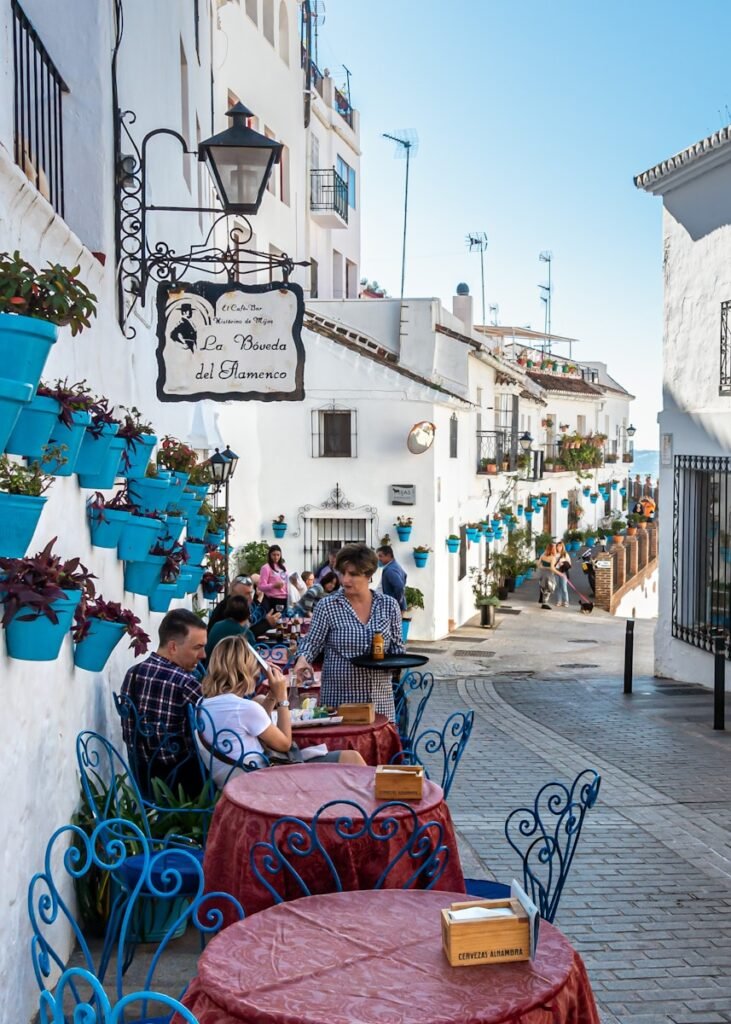Spain Digital Nomad Visa: Your Complete Guide for 2025
Imagine sipping your morning café con leche in a sunny plaza, working from your laptop with the Mediterranean breeze flowing through the air. If you’re a remote worker dreaming of living in Spain, the Spain digital nomad visa might be your golden ticket! With more countries welcoming remote workers, Spain has officially joined the list, offering one of the most exciting digital nomad visas in Europe. But how does it work, who qualifies, and is it really worth the move? Let’s break it all down.
What is the Spain Digital Nomad Visa?
The Spain Digital Nomad Visa is a special visa designed for remote workers and freelancers who want to live in Spain while working for companies or clients located outside the country. This visa is part of Spain’s push to attract international talent and boost the economy by welcoming remote workers from around the world. It provides legal permission for non-EU citizens to reside in Spain while maintaining their remote jobs or freelance work.
The visa is especially popular among digital nomads looking for a vibrant lifestyle in cities like Barcelona, Madrid, or Valencia, offering the perfect blend of work and life balance.
When Was It Introduced?
The Spain Digital Nomad Visa was officially introduced in early 2023 as part of the Startup Act — a larger initiative by the Spanish government to promote entrepreneurship and innovation. The visa is part of Spain’s strategy to attract skilled professionals and position the country as a hub for remote work in Europe.
While many other European countries have introduced similar visas, Spain’s Digital Nomad Visa quickly became one of the most attractive options thanks to its combination of relatively low income requirements, sunny climate, and high quality of life.
Purpose of the Visa for Remote Workers
The main purpose of the Spain Digital Nomad Visa is to allow non-EU remote workers to legally live and work in Spain without needing to apply for a traditional work visa. The visa caters to:
- Remote employees working for companies outside of Spain
- Freelancers offering services to international clients
- Entrepreneurs running their own online businesses
It provides a legal framework that makes it easier for digital nomads to settle in Spain without breaking any immigration laws or worrying about visa restrictions.
This visa is especially appealing for those who want to experience Spanish culture, enjoy the Mediterranean lifestyle, and take advantage of Spain’s lower cost of living compared to many other Western countries.
How Long Can You Stay?
With the Spain Digital Nomad Visa, you can stay in Spain for up to 12 months initially. After the first year, the visa can be renewed for up to five years in total — making it one of the longest-lasting digital nomad visas in Europe.
Another great benefit is that time spent on the Digital Nomad Visa counts towards permanent residency in Spain, which makes it an attractive option for those considering a long-term move.
During your stay, you’re also allowed to travel freely within the Schengen Zone — perfect if you want to explore other European countries while based in Spain.

Who Can Apply for the Spain Digital Nomad Visa?
Spain’s Digital Nomad Visa is designed to attract remote workers from around the world who want to live and work in Spain while maintaining their job with a company or clients outside of Spain. But not everyone qualifies — there are certain requirements you’ll need to meet to apply.
Eligibility Requirements
To apply for the Spain Digital Nomad Visa, you need to meet several key requirements. The visa is aimed at remote workers, freelancers, and entrepreneurs who can perform their jobs entirely online. The basic eligibility criteria include:
- You must work for a company located outside of Spain or have clients based outside of Spain.
- Your work must be fully remote and not require you to attend a physical office in Spain.
- You need to prove that you’ve been working remotely for at least three months before applying.
- Your employer or clients must allow remote work in your contract.
- You can’t be a resident of Spain when applying.
- You must not have a criminal record in Spain or any country you’ve lived in during the last five years.
Types of Remote Workers Who Qualify
The Spain Digital Nomad Visa is open to different types of remote workers, including:
Employees Working for a Foreign Company
If you’re employed by a company based outside of Spain and your job can be done remotely, you’re eligible to apply. You’ll need to provide proof of your employment contract and permission from your employer to work remotely from Spain.
Freelancers and Self-Employed Professionals
Freelancers and self-employed workers can also apply, as long as at least 80% of their income comes from clients outside of Spain. You’ll need to show contracts or invoices from your clients to prove your income.
Entrepreneurs with International Clients
If you’re running your own business and your clients are based outside of Spain, you’re eligible too. You’ll need to demonstrate that your business is fully remote and doesn’t require any physical presence in Spain.
Minimum Income Requirements (2025 Updated Numbers)
One of the most important requirements is proving that you have enough income to support yourself while living in Spain. For 2025, the minimum income requirement is set at €2,700 per month or €32,400 per year. This amount is based on 200% of the Spanish Minimum Interprofessional Salary (SMI).
If you’re bringing family members with you, the income requirement increases by approximately 75% for the first family member and 25% for each additional family member.
Here’s a breakdown of the minimum income requirements:
- Single applicant: €2,700 per month
- Applicant + 1 family member: €4,725 per month
- Applicant + 2 family members: €5,400 per month
Nationalities Eligible
The Spain Digital Nomad Visa is open to non-EU/EEA nationals. That means if you’re from countries like the US, Canada, the UK, Australia, or Mexico, you’re eligible to apply. Citizens from the EU, EEA, or Switzerland don’t need this visa since they already have the right to live and work in Spain.
Documents Needed
The application process requires a few key documents to prove your eligibility:
- Valid passport
- Proof of remote work (employment contract or freelance contracts)
- Criminal background check (from your home country and any country you’ve lived in during the last five years)
- Health insurance with full coverage in Spain
- Proof of income (bank statements, invoices, or contracts)
- Proof of accommodation in Spain (rental agreement or hotel booking)
- Medical certificate confirming you’re in good health
It’s important to have all your documents translated into Spanish and certified if they’re in another language.

If you’re thinking about applying, gathering the right documents and meeting the income requirements are the first steps to making your dream of living in Spain a reality.
How to Apply for the Spain Digital Nomad Visa
Step-by-Step Application Process
Applying for the Spain Digital Nomad Visa might sound a little overwhelming at first, but once you break it down, it’s actually pretty straightforward. Here’s a step-by-step guide to help you through the process:
- Gather Your Documents: Start by collecting all the required paperwork (we’ll cover that in detail below). Make sure everything is up-to-date and translated into Spanish if necessary.
- Submit Your Application: You can either apply from your home country at the Spanish consulate or embassy or, if you’re already in Spain on a tourist visa, you can apply directly from within Spain.
- Pay the Visa Fee: The application fee is typically around €75–€150, but it can vary depending on where you’re applying from.
- Wait for Approval: Processing times usually range between 20 to 45 days, but it’s always a good idea to check with your local consulate for the most up-to-date info.
- Pick Up Your Visa: Once approved, you’ll receive your visa, which allows you to live and work remotely in Spain.
Where to Apply (Spain Consulates or In-Country)
You have two options when it comes to applying for the Spain Digital Nomad Visa:
- Applying from Your Home Country: This is the standard route for most applicants. You’ll need to book an appointment at the nearest Spanish consulate or embassy and submit your documents in person.
- Applying from Spain: If you’re already in Spain on a tourist visa, you can apply directly through the Spanish immigration office. This option can sometimes be faster, but it does require a little more paperwork.
Timeline for Processing
The official processing time is between 20 to 45 days, but in reality, it can take a little longer depending on how busy the consulate is or if any documents are missing. If you’re applying from Spain, the process is often quicker, but still plan for at least a month.
Fees Involved
Here’s a rough breakdown of the costs involved:
- Visa application fee: €75–€150 (depending on your nationality)
- Translation and notarization of documents: €100–€300
- Criminal record check: €10–€50
- Health insurance: €50–€100 per month
Make sure to budget for these expenses ahead of time so there are no surprises along the way.
Tips to Avoid Common Mistakes
- Double-check your documents: Missing paperwork is one of the biggest reasons applications get delayed or rejected.
- Translate everything into Spanish: Even if your documents are in English, most consulates require certified translations.
- Show proof of income consistently: Bank statements, contracts, or invoices should clearly show you meet the minimum income requirement.
- Be patient: The process can take time, but staying organized and following up politely can help speed things up.
- Get health insurance before applying: It’s a mandatory requirement, so make sure your policy meets the visa criteria.
Applying for the Spain Digital Nomad Visa isn’t the fastest process, but with the right preparation, it’s totally doable. If you’re serious about making Spain your remote work base, the effort is definitely worth it
Benefits of the Spain Digital Nomad Visa
Tax Advantages (Beckham Law for Digital Nomads)
One of the biggest perks of the Spain Digital Nomad Visa is the potential tax benefits. Under the Beckham Law, digital nomads can pay a flat 24% income tax on their foreign income up to €600,000 per year—which is significantly lower than Spain’s standard income tax rates. This tax break is available for up to 6 years.
Access to Healthcare
Once you have your residence permit, you’ll be able to access Spain’s public healthcare system. However, during the application process, you’ll need to show proof of private health insurance.
Bringing Family Members
One of the best things about this visa is that you can bring your spouse and children with you. Your family members will receive residence permits as dependents, but you’ll need to prove that you have enough income to support them.
Residency Rights
The Spain Digital Nomad Visa gives you legal residency in Spain, which means you can rent an apartment, open a bank account, and register for services just like any other resident.
Traveling Within the Schengen Zone
With the Spain Digital Nomad Visa, you’ll have the freedom to travel across the Schengen Zone without needing additional visas. This means weekend trips to France, Italy, or Portugal are just a train ride away.

Challenges and Things to Consider
Spanish bureaucracy (Patience is key!)
Spain is known for its bureaucracy, and dealing with paperwork can be a slow and frustrating process. Be prepared for delays, multiple appointments, and lots of back-and-forth communication. Having a lot of patience and double-checking all your documents will make the process smoother.
Finding accommodation
Securing long-term accommodation can be tricky, especially in cities like Barcelona or Madrid where demand is high. Many landlords require several months of rent upfront or proof of income before renting to foreigners. Websites like Idealista or Spotahome are good places to start your search.
Language barrier
While many people in larger cities speak English, knowing basic Spanish will make life much easier. In smaller towns, English speakers can be harder to find. Apps like Duolingo or taking local language classes can help you get by.
Internet reliability in different regions
Internet reliability is generally good in urban areas, but more rural regions can have slower connections. Research the internet speeds in your chosen destination before settling down if remote work is your priority.
Cost of living in popular digital nomad cities
The cost of living varies significantly across Spain. Here’s a rough idea of monthly expenses:
- Barcelona: €1,800-€2,500
- Madrid: €1,700-€2,400
- Valencia: €1,200-€1,800 Smaller towns and rural areas tend to be more affordable, but they might lack the same digital nomad communities and amenities.
Best Cities in Spain for Digital Nomads
Spain has a lot to offer digital nomads, from buzzing cities to laid-back beach towns. Whether you’re into vibrant nightlife, rich culture, or peaceful nature, there’s a perfect spot waiting for you. Here’s a breakdown of some of the best cities to consider.
Barcelona
Barcelona is one of the most popular cities for digital nomads, and it’s easy to see why. The city blends beach life with a cosmopolitan atmosphere, offering plenty of coworking spaces, cafés, and networking events. The international community here is huge, making it easier to meet other remote workers. However, Barcelona can be expensive, especially when it comes to rent, so it’s worth checking out neighborhoods like Poble-sec or Gràcia for more affordable options.
Why choose Barcelona?
- Vibrant digital nomad community
- Beach and city life combined
- Plenty of coworking spaces
- Great public transport
Madrid
Madrid might not have the beach, but it’s Spain’s capital for a reason. The city is full of life, with countless bars, restaurants, and cultural events. It’s a great option if you’re looking for a more authentic Spanish experience with fewer tourists compared to Barcelona. The cost of living is slightly lower, and there are plenty of coworking spaces around Malasaña and Chamberí.
Why choose Madrid?
- Rich cultural scene
- Great public transport
- Big expat and digital nomad community
- Central location for traveling around Spain
Valencia
Valencia is quickly becoming a digital nomad hotspot. It’s more affordable than Barcelona and Madrid but still offers great weather, beaches, and a relaxed atmosphere. The city has a growing remote worker community, especially in the Ruzafa neighborhood, and plenty of coworking spaces.
Why choose Valencia?
- Affordable cost of living
- Beach city with great weather
- Growing digital nomad community
- Amazing food scene (hello, paella!)
Malaga
If you’re into sunny weather and a more laid-back lifestyle, Malaga could be your place. Located on the Costa del Sol, Malaga offers great coworking spaces, affordable rent compared to bigger cities, and a thriving expat community. The pace of life here is slower, making it ideal if you’re looking for a better work-life balance.
Why choose Malaga?
- 300+ days of sunshine per year
- Lower cost of living
- Relaxed atmosphere
- Easy access to nature and beaches
Las Palmas (Canary Islands)
For those who prefer island life, Las Palmas in Gran Canaria is one of the best digital nomad destinations in Spain. The internet is surprisingly reliable, and the cost of living is lower than most mainland cities. There’s a big international digital nomad scene, especially around Las Canteras Beach.
Why choose Las Palmas?
- Warm weather year-round
- Big digital nomad community
- Affordable rent
- Beach lifestyle
Smaller Hidden Gems
If you’re looking to escape the crowds, there are plenty of smaller cities and towns that are perfect for remote work.
- Granada: Affordable, with a vibrant student scene and stunning Alhambra views.
- San Sebastián: Great food, beautiful beaches, and a more relaxed atmosphere (but higher cost of living).
- Alicante: Sunny, affordable, and not too crowded – perfect if you’re after a slower pace of life.
- Tenerife (Canary Islands): Another island option with coworking spaces and an outdoor lifestyle.
How to Choose the Right City for You
When deciding where to base yourself, think about what matters most to you. Do you need fast internet for video calls? Do you prefer a big city or a smaller, quieter town? Are you more into beach life or city vibes?
Spain has something for everyone, and the beauty of being a digital nomad is that you can always move around until you find your perfect fit.

Living in Spain as a Digital Nomad: What to Expect
Cost of Living Breakdown
Spain offers a wide range of living costs depending on the city and lifestyle you choose. Larger cities like Barcelona and Madrid tend to be more expensive, especially when it comes to rent and dining out. On the other hand, smaller cities like Valencia, Malaga, and Granada offer more affordable options without sacrificing quality of life.
Here’s a rough breakdown of monthly expenses you can expect in 2025:
- Rent (1-bedroom apartment): €800–€1,500 in major cities, €500–€900 in smaller towns
- Groceries: €200–€400
- Dining out: €10–€20 for a menu del día, €40–€60 for a nice dinner
- Co-working space membership: €150–€300
- Transportation: €50–€100 (depending on the city and whether you need a monthly metro pass)
- Internet and utilities: €100–€150
It’s always a good idea to plan your budget carefully before moving and keep some savings for unexpected expenses.
Co-Working Spaces and Digital Nomad Communities
One of the best parts of living in Spain as a digital nomad is the thriving co-working scene. Most major cities have plenty of co-working spaces where you can meet other remote workers, network, and get work done in a social environment.
Popular co-working spaces include:
- Barcelona: OneCoWork, Betahaus
- Madrid: Impact Hub, Utopicus
- Valencia: Vortex Playa, Wayco
- Malaga: The Living Room, Innovation Campus
Besides co-working spaces, many cities have dedicated digital nomad meetups, Facebook groups, and WhatsApp chats where you can connect with like-minded people. Platforms like Meetup and Nomad List can also help you find events and communities nearby.
Spanish Culture and Work-Life Balance
Spain is known for its laid-back lifestyle, which can be both a blessing and a challenge for digital nomads. The famous siesta culture still influences daily life in many cities, with shops and businesses closing for a few hours in the afternoon.
Work-life balance is taken seriously, with many Spaniards prioritizing socializing, family time, and long meals. This slower pace might take some getting used to if you’re coming from a more fast-paced culture, but it can also be a great opportunity to unwind and enjoy life outside of work.
Tips on Making Friends and Networking
Moving to a new country can feel lonely at first, but Spain is a friendly and social country where it’s relatively easy to meet people. Here are some tips to help you integrate:
- Join language exchange events (intercambios) to practice Spanish and meet locals
- Sign up for co-working spaces or digital nomad groups
- Use apps like Meetup, Bumble BFF, and Facebook groups to find local events
- Take up a new hobby like salsa dancing, surfing, or yoga
- Don’t be afraid to chat with people at cafes or bars—Spaniards are usually open and welcoming
Networking as a digital nomad can open up both professional and personal opportunities, making your time in Spain even more rewarding.

Conclusion – Spain Digital Nomad Visa
The Spain digital nomad visa is a game-changer for remote workers looking to soak up the Spanish sun while pursuing their careers. Whether you’re dreaming of tapas nights in Seville or beach days in Valencia, this visa could make it all possible. While there are some hoops to jump through, the lifestyle rewards are more than worth it. Ready to make Spain your next remote work destination?
I also wrote a blogpost about the Italy Digital Nomad Visa and Japan Digital Nomad Visa: Everything You Need to Know in 2025







